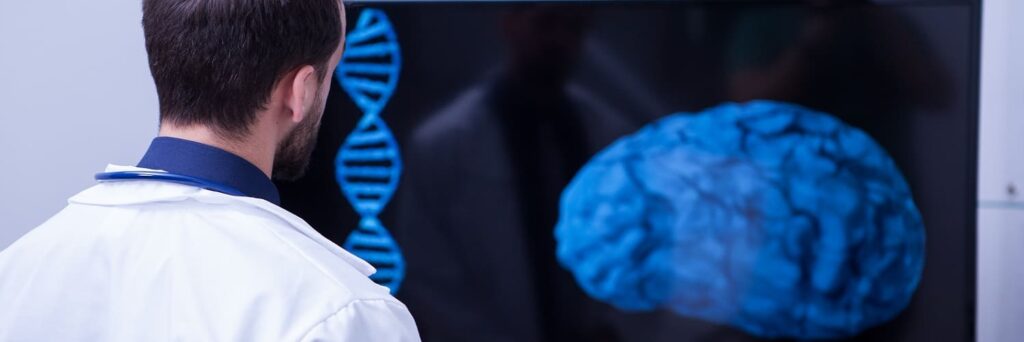Best Hospital for Diabetic Neuropathy in Mumbai
RNR Medicine at Jaslok Hospital is the best hospital for diabetic neuropathy in Mumbai, offering non-invasive neuromodulation treatment for psychiatric diseases and chronic pain in neurological conditions. RNR Medicine uses cutting-edge technology and evidence-based protocols to help you overcome your symptoms and improve your quality of life. RNR Medicine is led by Dr. Paresh K Doshi, a consultant neurosurgeon with expertise in deep brain stimulation, epilepsy surgery, and movement disorders.
Introduction to Diabetic Neuropathy
Diabetic Neuropathy is a complication associated with diabetes, resulting in nerve damage. Approximately 50% of individuals with severe diabetes develop this condition. It is characterized by symptoms such as pain, paresthesia, and, in advanced stages, complications like sleep disturbances, depression, foot ulcers, hemorrhage, decline in motor function, and, in extreme cases, amputation. The high incidence of these complications not only increases the risk of mortality but also significantly impacts the patient’s quality of life. While painful neuropathy may be managed with antidepressants, anticonvulsants, and opioid agonists, these medications are often ineffective and may cause severe side effects.
Ongoing research worldwide is dedicated to finding innovative methods to alleviate the suffering and disability associated with diabetic neuropathy. Transcranial magnetic stimulation (TMS) is one such novel approach that has demonstrated promising results in recent studies. TMS is a painless and noninvasive method that modulates cortical excitability, offering potential benefits for individuals with diabetic neuropathy.
Consult With Expert Doctors
Candidacy for TMS in Diabetic Neuropathic
- Diabetic neuropathic pain often presents as a burning, stinging, or tingling sensation, resembling electric shocks, and can occur spontaneously or be provoked. This type of pain can significantly impact an individual’s functionality and overall quality of life. Moreover, depression is frequently associated with both painful and painless diabetic neuropathy.
- Transcranial Magnetic Stimulation (TMS) has demonstrated supportive results in various trials as a treatment for depression associated with diabetic neuropathy. This non-invasive technique, which modulates cortical excitability, shows promise in alleviating the symptoms and improving the mental well-being of individuals dealing with diabetic neuropathy-related pain and depression.
- Importantly, TMS is considered a suitable treatment option for a broad range of patients, including those with pregnancy, hypertension, diabetes, thyroid disorders, kidney diseases, heart diseases, and other medical conditions. Additionally, common medical devices like stents, pacemakers, coils, orthopedic implants, etc., are typically MRI compatible and do not interfere with the application of TMS.
Present Literature
TMS has been extensively researched worldwide since the 1980s, with a wealth of literature published in peer-reviewed journals highlighting positive outcomes and negligible adverse effects. One noteworthy study on TMS and Diabetic Neuropathy is a European investigation that delved into the impact of deep Transcranial Magnetic Stimulation (dTMS) on the motor-cortical lower limb areas.
In this study, 25 participants underwent 20-minute dTMS sessions over five consecutive days, targeting specific brain regions associated with the lower limb. The results indicated a notable alleviation of pain in the lower limb areas, and importantly, no adverse effects were observed. This study underscores the potential efficacy of dTMS in providing relief for individuals with Diabetic Neuropathy when specific brain regions are targeted.
Method
- TMS is a non-invasive method of Neuromodulation.
- It employs low-energy magnetic stimulation of a specific brain site through the skull.
- The stimulation is delivered via a specially designed coil in a helmet.
- When the patient arrives, the nurse records a detailed history and updates the doctor.
- The doctor discusses the suitable protocol, including session duration, frequency per week, and total sessions.
- Once confirmed, the protocol is input into the computer.
- An evaluation is conducted to determine the Motor Threshold (MT) through helmet-based stimulation.
- Following pre-established protocols, TMS is administered to the patient.
- The procedure doesn’t require sedation or anesthesia, and fasting is unnecessary.
Consult With Expert Doctors
Why Should You Choose Jaslok Hospital for TMS?
The Jaslok Hospital & Research Centre stands as one of the oldest tertiary care, multi-specialty Trust hospitals in the country. The hospital actively engages in ongoing research activities across various fields, collaborating with institutions in India and abroad. Within its framework, there exists a dedicated “Restorative and Regenerative Medicine” department comprising consultants with over 20 years of experience.
Equipped with cutting-edge technology and equipment from the internan ationally reputed “Brainsway” company, the department features the advanced H1-7 coils, a departure from conventional coils. This technology facilitates the delivery of noninvasivae deep Transcranial Magnetic Stimulation (TMS) with precision, aiming to achieve optimal results. The equipment holds FDA and CE clearance for treating various neurological and psychiatric conditions. Notably, deep TMS expands the capabilities beyond the limitations of conventional TMS by reaching specific target sites like the insula and cingulate gyrus.

